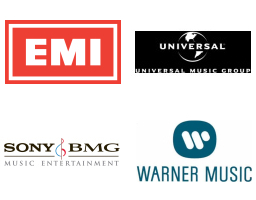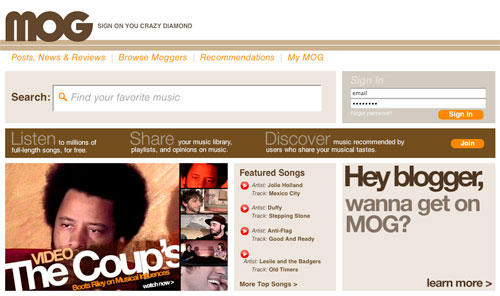MOG


Blogging has become a revolutionary tool in today's online world. It has become a powerful medium for anyone to voice their opinions for all to read and even establish themselves as a credible source for information. Since online music social networks have taken center stage for music promotion, it was a inevitable step for these networks to incorporate blog platforms. One of the more successful social networks to really put an emphasis on blogging and take it to the next level was MOG. This web site has all the tools you would expect for a social network such as dedicated pages to artist's, blog platform, albums and songs, tagging music, and direct links to itunes and amazon for purchasing artist's music. With the basics out of the way, we can get to other specialty tools that they offer musicians and music lovers.
With last.fm and Pandora at the for-front of music recommendation, it is hard to stake claim in that arena. Though lasting MOG has done so in there own way, they still fall behind the curtain of the latter. With a system driven by user recommendations, MOG connects people with similar musical taste and then displays the music collections on their iPods and hard drives. It is a bummer though that you are only given a 30 second preview of your chosen song but at least they make it clear that you can purchase the song or album from either iTunes or Amazon via links on their page. As a small saving grace to the restrictions of hearing a full song on an artist profile, MOG lets members upload entire tracks which allows visitors to stream the uploaded music. So getting to hear a full length track is either hit or miss. Micheal Arrinton has written a great article on TechCrunch claiming that "MOG has created the ultimate streaming app". Simply put, MOG is sitting on a new version of their streaming service but the launch is in limbo due to the four major record labels ( SonyBMG, UMG, EMI, WMG) not being able to play nice with each other. Hopefully for MOG the big four can work together, share the candy , and be a part of something that could potentially be the next myspce or youtube.

MOG is basically a music discovery engine who's only real time promotional tools for musicians is the blog platform, dedicated artist page, and posted music with direct links to buy. Since this site is geared towards a community of listeners, discoverers, and commenters, it is no surprise that more powerful tools are not supplied to the musician for better promoting their work in this harsh new environment of online and physical music promotion. As a music lover this is a great site to engage in a flourishing community to find like minded individuals to chat with and share opinions, but if you are looking for powerful tools to better promote your work and efforts, you should probably keep on searching for a site that will better suite your demanding needs as an independent musician.
Mog Summary:
- Music source: Major Record Label Catalogs, Independent record label catalogs
- Platform: Basic HTML based web service
- Target Audience: Mainstream and indie followers, blog writers and readers, Bands and musicians
Die Hard Fans

The music industry is changing. Actually, it has already changed. Sure, there is still plenty of money in ultra-mainstream mass-produced pop music targeted at pre-teens and tweens who don't know any better. But overall, the industry is moving towards a more interesting model of independent artists who want nothing to do with the major labels. These artists are self-promoting and staking out new avenues for supporting their music careers.
Today's cutting-edge independents are more concerned with having control over their art, giving marketing a backseat to creativity. Rather than taking a traditional big-money approach to marketing (massive advertising of CDs, relying on CD sales for revenue, demanding royalties), there are increasing numbers of independent artists who self-produce, self-promote, and give away their recorded works for free in order to build a following of die-hard fans who will pay money for truly limited goods, such as live shows, merchandise, and limited runs of special edition CDs, DVDs, and other unique products.
While this model may sound radical, it has already been proven to work quite well. For example, Trent Reznor, of Nine Inch Nails, has found great success promoting his own artistic releases and giving away recordings via his website. His true fans are still paying top dollar for limited goods and tickets to live performances. Reznor says he made more money in the first week of his recent release, Ghosts I-IV, which made over $1.6 million in a single week with no big-money advertising or marketing. And the entire project was free to download and licensed under the Creative Commons License which allows derivative works and free redistribution.
Another striking example of independent profitability is Radiohead, who's 2008 release of In Rainbows was given away for free in digital format on their website, with an option to pay any amount you wanted for the downloads. Naturally, not everyone paid, but enough people did that the record was still a great success, and many more CDs and downloads were sold through other avenues like iTunes and at record stores. Overall, according to a report from Warner Chappell, pre-release sales of In Rainbows were more profitable than the total money sales from their previous release Hail to the Thief.
The whole concept here is that, basically, an artist's fans are divided, more or less, into two distinct groups: Leechers and Valued Fans. Leechers aren't going to pay--they were never going to pay. They were going to listen to your CD at a friend's house, or find a torrent for it on The Pirate Bay, or just make a copy from someone's CD or iPod. If they couldn't get their hands on it illegally, they weren't going to buy it anyway. In short, these fans offer no money directly regardless of the distribution options, but that doesn't make them worthless. By making copies and listening to the music anyway, they increase a band's exposure and share the art with their friends and acquaintances, which ultimately amounts to free promotion.
Then we have the Valued Fans. These are the people who will buy your CD regardless of whether you give the downloads away for free or not. They want the cover art, they want the physical item in their hands that they can look at and add to their collections. These fans want to go to your shows, they want to own t-shirts and posters, and they'll shell out $300 for the limited edition DVD set of your best live performances and interviews. These people are paying Radiohead $5 for the free downloads because they want Radiohead to succeed and they value the artistic creativity and contribution to society.
When you really think about it, trying to squeeze money out of those Leechers is a complete waste of time. Instead, give the Leechers what they want, give them the music and the reduced-size images on websites, and let them promote your work for you. They aren't worthless, they just need to be exploited for what they are: carriers of your art who have great potential to give you exposure to Valued Fans who will bring revenues back to you.
With this in mind, it becomes easier to understand the value of giving away the work for free. Leechers will get their hands on it regardless, and they will increase your exposure overall. Increased exposure means greater chance at building a base of Valued Fans who will actually pay money for your scarce goods and printed CDs.
If you would like further reading on this topic, Mike Masnick of Techdirt covers current trends and news on a daily basis. He is essentially the de-facto authority on monetizing bands and "free" services. It's all about real value, and there is plenty of value in art beyond just recorded media.
Welcome to the Music 2.0 Blog
Hi! Thanks for dropping by.
Quick explanation: This blog will focus on overviews, analysis, and a little bit of opinion on the current trends in online music. There are a bunch of new and interesting web services out there for both musicians and fans alike. Mostly these services are making headway towards a new and radically different music industry, one in which artists are increasingly independent, and the antiquated model of capitalizing on recorded works is quickly be replaced with a more open and free marketplace where artists give away their recordings for free and generate revenue from merchandise sales, live shows, and die-hard fans.
We're going to explore some of these services, write a bit about what is going on in terms of the changing music industry landscape, and how it might affect you, the artist and/or music lover.
Please feel free to leave comments and involve yourself in discussions here. Music 2.0 is a big topic, and while it is generally heading in a positive direction, much remains to be determined regarding where the new music industry will find itself in this modern era of easy access to media and information.
 Subscribe
Subscribe